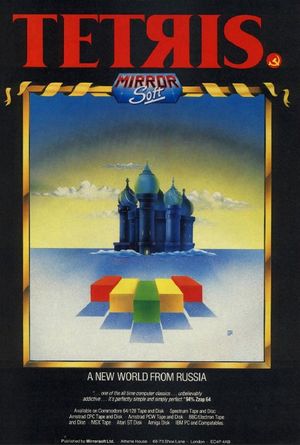Tetris (Mirrorsoft video game): Difference between revisions
(Redirected page to Tetris (Spectrum Holobyte video game)) Tag: New redirect |
(Removed redirect to Tetris (Spectrum Holobyte video game)) Tag: Removed redirect |
||
| Line 1: | Line 1: | ||
{{Infobox_Software | | |||
software_name = Tetris| | |||
software_image = [[File:Tetris (Mirrorsoft) cover.jpg|300px]]| | |||
developer = [[Mirrorsoft]]| | |||
publisher = [[Mirrorsoft]]| | |||
systems = [[Acorn Electron]], [[Amiga]], [[Amstrad CPC]], [[Amstrad PCW]], [[Atari ST]], [[BBC Micro]], [[MSX]], [[ZX Spectrum]]| | |||
release = '''DOS'''<br />United States: January 1988<br />'''Amiga, Apple II, Mac OS'''<br />United States: 1988<br />'''Atari ST'''<br />United States: 1989| | |||
added_to_museum = DOS: April 5, 2020| | |||
}} | |||
'''''Tetris''''' is an influencial puzzle [[video game]]. [[Spectrum Holobyte]] developed the first version to be released outside of the USSR. | |||
==Development== | |||
The original version of ''[[Tetris]]'' was developed by [[Alexey Pajitnov]] on an [[Elektronika 60]] [[computer]] while employed as a computer engineer at the Dorodnitsyn Computing Centre of the [[Academy of Sciences of the Soviet Union|Academy of Sciences]] in the Union of Soviet Socialist Republics on June 6, [[1984]]. | |||
It was ported to [[DOS]] by [[Vadim Gerasimov]], then a high school student, and was expanded by Gerasimov, Pajitnov, and [[Dmitry Pavlovsky]], a computer engineer, from 1984 to 1986. | |||
==Original commercial release== | |||
As the game was made in the USSR, a communist country that was largely closed to outsiders, it was irregular for a product to have a worldwide commercial release. | |||
However, a British man named [[Robert Stein]] sought the rights to ''Tetris''. He first made telephone calls with Pajitnov, and later was told to deal with AcademySoft, the internal licensing and publishing division of the Soviet Academy. He was told that they were interested, and, taking this as a verbal agreement, began to make deals with the British publisher [[Mirrorsoft]] to sell ''[[Tetris (Mirrorsoft video game)|Tetris]]'' for [[computer]]s in Europe and the American publisher Spectrum HoloByte to sell ''Tetris'' for computers in North America. | |||
Before ''Tetris'' was commercially released Stein was contacted by the Soviet organization known as [[Elektronorgtechnica]], or Elorg, which informed him that he did not have a contract to publish ''Tetris'' and that all further negotiations would have to go through them. | |||
Stein flew to the Soviet Union to meet with Elorg directly, however, before any contract was signed, the commercial version of ''Tetris'' was released, in January 1988, and became huge successes. Stein eventually signed a deal with Elorg on May 10, 1988, which gave him the right to release ''Tetris'' on home computers as well as the vaguely worded "different types of computers". | |||
[[Category:Items included in physical compilations owned by WEC Museum]] | |||
[[Category:puzzle games]] | |||
[[Category:Video games]] | |||
[[Category:Video games developed by Spectrum Holobyte]] | |||
[[Category:Video games published by Mirrorsoft]] | |||
[[Category:Video games published by Spectrum Holobyte]] | |||
[[Category:Video games developed in the United States of America]] | |||
[[Category:video games released in 1988]] | |||
[[Category:video games released in 1989]] | |||
[[Category:video games released on Acorn Electron]] | |||
[[Category:video games released on Amiga in the United Kingdom]] | |||
[[Category:video games released on Amstrad CPC]] | |||
[[Category:video games released on Amstrad PCW]] | |||
[[Category:video games released on Atari ST in the United Kingdom]] | |||
[[Category:video games released on BBC Micro]] | |||
[[Category:video games released on MSX in the United Kingdom]] | |||
[[Category:video games released on ZX Spectrum]] | |||
Revision as of 06:34, 18 June 2024

| |
| Tetris | |
| Developer | Mirrorsoft |
|---|---|
| Publisher | Mirrorsoft |
| Platforms | Acorn Electron, Amiga, Amstrad CPC, Amstrad PCW, Atari ST, BBC Micro, MSX, ZX Spectrum |
| Released | DOS United States: January 1988 Amiga, Apple II, Mac OS United States: 1988 Atari ST United States: 1989 |
| Added to Museum |
DOS: April 5, 2020 |
Tetris is an influencial puzzle video game. Spectrum Holobyte developed the first version to be released outside of the USSR.
Development
The original version of Tetris was developed by Alexey Pajitnov on an Elektronika 60 computer while employed as a computer engineer at the Dorodnitsyn Computing Centre of the Academy of Sciences in the Union of Soviet Socialist Republics on June 6, 1984.
It was ported to DOS by Vadim Gerasimov, then a high school student, and was expanded by Gerasimov, Pajitnov, and Dmitry Pavlovsky, a computer engineer, from 1984 to 1986.
Original commercial release
As the game was made in the USSR, a communist country that was largely closed to outsiders, it was irregular for a product to have a worldwide commercial release.
However, a British man named Robert Stein sought the rights to Tetris. He first made telephone calls with Pajitnov, and later was told to deal with AcademySoft, the internal licensing and publishing division of the Soviet Academy. He was told that they were interested, and, taking this as a verbal agreement, began to make deals with the British publisher Mirrorsoft to sell Tetris for computers in Europe and the American publisher Spectrum HoloByte to sell Tetris for computers in North America.
Before Tetris was commercially released Stein was contacted by the Soviet organization known as Elektronorgtechnica, or Elorg, which informed him that he did not have a contract to publish Tetris and that all further negotiations would have to go through them.
Stein flew to the Soviet Union to meet with Elorg directly, however, before any contract was signed, the commercial version of Tetris was released, in January 1988, and became huge successes. Stein eventually signed a deal with Elorg on May 10, 1988, which gave him the right to release Tetris on home computers as well as the vaguely worded "different types of computers".